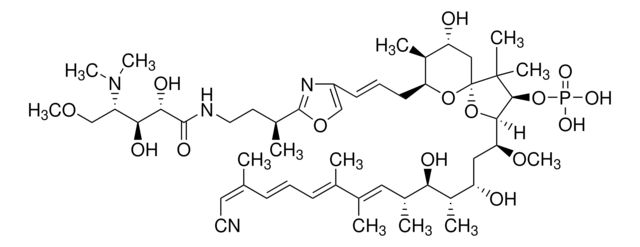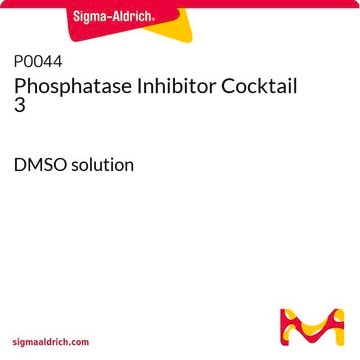208851
Calyculin A
from Discodermia calyx, ≥98% (HPLC), crystalline (powder), protein phosphatases types 1 and 2A inhibitor, Calbiochem
Synonym(s):
Calyculin A, Discodermia calyx
About This Item
Recommended Products
product name
Calyculin A, Discodermia calyx, Calyculin A, CAS 101932-71-2, is a cell-permeable inhibitor of protein phosphatase 2A (IC₅₀ = 0.5-1 nM) and protein phosphatase 1 (PP1; IC₅₀ = 2 nM).
Quality Level
Assay
≥98% (HPLC)
form
crystalline (powder)
manufacturer/tradename
Calbiochem®
storage condition
OK to freeze
desiccated (hygroscopic)
protect from light
color
white
solubility
ethanol: 2 mg/mL
DMSO: soluble
shipped in
ambient
storage temp.
−20°C
InChI
1S/C50H81N4O15P/c1-29(20-22-51)16-14-17-30(2)32(4)24-33(5)42(57)35(7)38(55)25-41(65-13)45-46(69-70(61,62)63)49(8,9)50(68-45)26-39(56)34(6)40(67-50)19-15-18-36-27-66-48(53-36)31(3)21-23-52-47(60)44(59)43(58)37(28-64-12)54(10)11/h14-18,20,24,27,31,33-35,37-46,55-59H,19,21,23,25-26,28H2,1-13H3,(H,52,60)(H2,61,62,63)/b16-14+,18-15+,29-20-,30-17+,32-24+/t31-,33+,34+,35+,37-,38-,39-,40+,41-,42+,43-,44-,45+,46-,50-/m0/s1
InChI key
FKAWLXNLHHIHLA-QJLNTFFJSA-N
General description
Biochem/physiol Actions
PP2A
Packaging
Warning
Reconstitution
Other Notes
Takeuchi, T., et al. 1994. Biochem. Biophys. Res. Commun. 205, 1803.
Figurov, A., et al. 1993. Eur. J. Neurosci. 5,1083.
Song, Q., and Lavin, M.F. 1993. Biochem. Biophys. Res. Commun.190, 47.
Gopalakrishna, R., et al. 1992. Biochem. Biophys. Res. Commun.189, 950.
Carl, A., et al. 1991. Am. J. Physiol.261, C387.
Suganuma, M., et al. 1990. Cancer Res.50, 3521.
Cohen, P. 1989. Annu. Rev. Biochem. 58, 453.
Cohen, P., et al. 1989. J. Biol. Chem.264, 21435.
Ishihara, H., et al. 1989. Biochem. Biophys. Res. Commun.159, 871.
Kato, Y., et al. 1988. J. Org. Chem.53, 3930.
Kato, Y., et al. 1986. J. Am. Chem. Soc.108, 2780.
Legal Information
Signal Word
Danger
Hazard Statements
Precautionary Statements
Hazard Classifications
Acute Tox. 3 Dermal - Acute Tox. 3 Inhalation - Acute Tox. 3 Oral - Skin Irrit. 2
Storage Class Code
6.1C - Combustible acute toxic Cat.3 / toxic compounds or compounds which causing chronic effects
WGK
WGK 3
Flash Point(F)
Not applicable
Flash Point(C)
Not applicable
Certificates of Analysis (COA)
Search for Certificates of Analysis (COA) by entering the products Lot/Batch Number. Lot and Batch Numbers can be found on a product’s label following the words ‘Lot’ or ‘Batch’.
Already Own This Product?
Find documentation for the products that you have recently purchased in the Document Library.
Our team of scientists has experience in all areas of research including Life Science, Material Science, Chemical Synthesis, Chromatography, Analytical and many others.
Contact Technical Service






